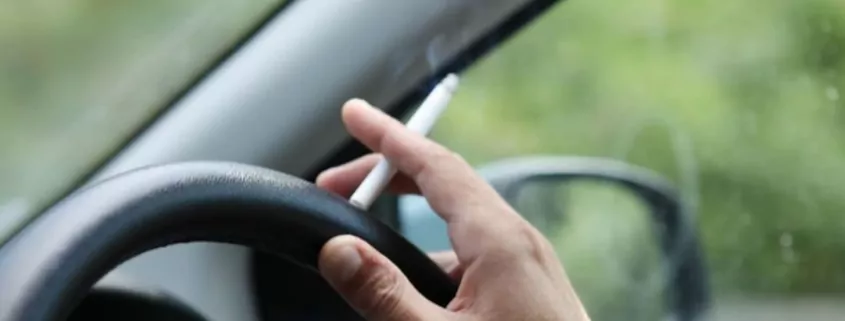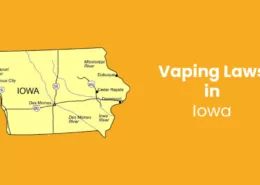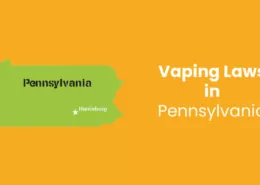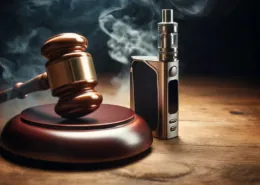Is It Illegal to Vape and Drive in Iowa?
For motorists in Iowa who smoke or vape, understanding the specific laws surrounding these activities while driving is crucial. With an increasing focus on distracted driving nationwide, many wonder what is and isn’t permissible behind the wheel. Is it legal to vape while driving alone? What if children are in the car? How do distracted driving laws apply? This guide provides a detailed breakdown of Iowa’s laws regarding vaping and driving as of 2025, ensuring you know your rights and responsibilities on the road.
Vaping and Smoking with Minors Present is Illegal
The most important and explicit law regarding vaping in a vehicle in Iowa is designed to protect children from secondhand smoke and aerosol exposure. While not cited in all provided materials, the general legal trend and specific regulations in many states, often referenced in public health discourse, point towards such protections. For example, Iowa law specifically prohibits smoking and vaping in foster homes and in any vehicle when a foster child is present.
While a universal ban for all private vehicles with any minor present isn’t explicitly detailed in the provided Iowa statutes, it’s a common piece of legislation in many states and a critical point of public health advocacy. Drivers should be aware that even if a specific statute isn’t in place for all private vehicles, the presence of minors can significantly influence law enforcement and judicial perspectives in the event of an incident.
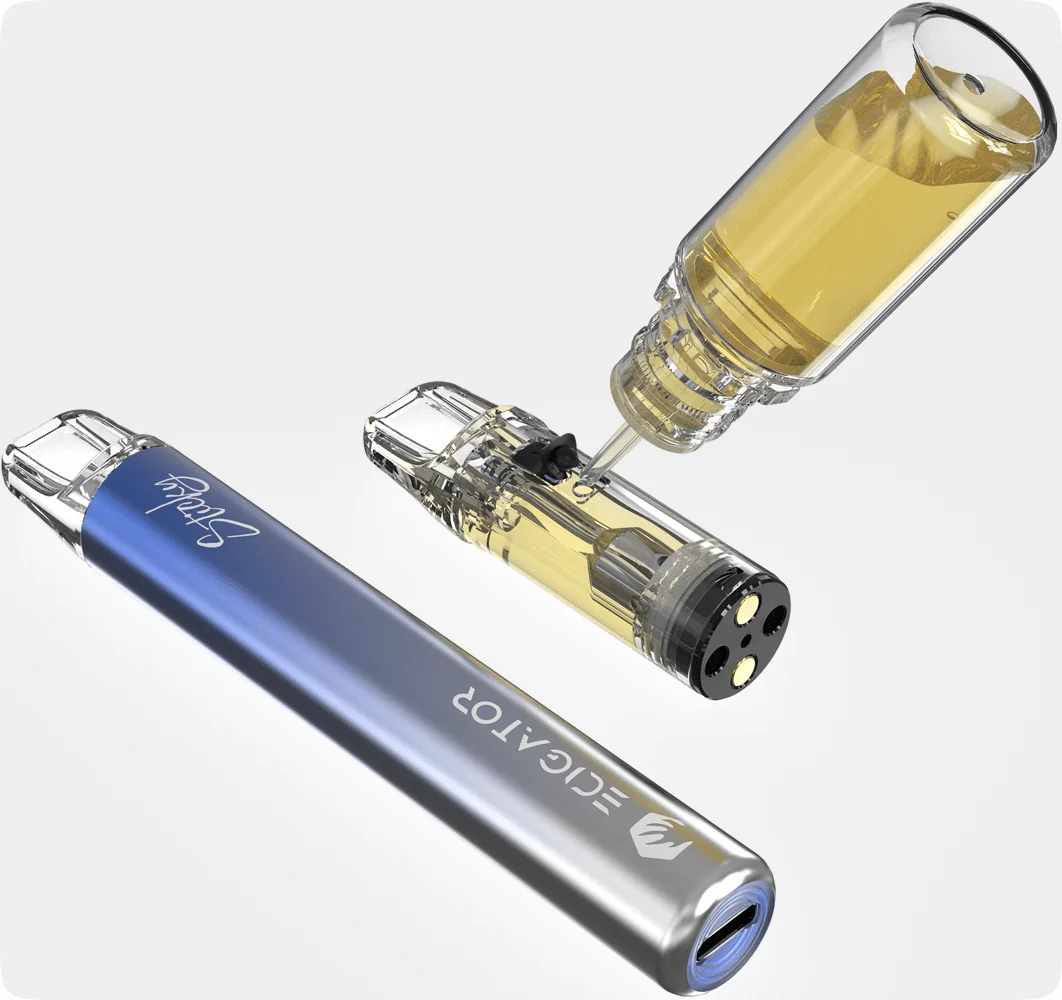
Ecigator Open Pod Kit for Starters
The Ecigator Sticky Refillable Open Pod Kit is a new type of vape device designed for beginners. It features a refillable pod and a rechargeable battery.
This means you don’t need to throw away a disposable prefilled pod — simply refill it instead. Each pod supports approximately 7–8 refills, and you can switch e-liquids to enjoy different flavors.
Vaping and Smoking While Driving for Adults is Legal But…
For adults aged 21 and over who are driving alone or with other adults (no minors present), there is no specific Iowa law that explicitly prohibits the act of vaping a nicotine product or smoking a traditional cigarette while driving. However, this legality is conditional and comes with several crucial caveats related to distracted driving and the substance being consumed.
Potential Distracted Driving Violations
While vaping or smoking itself isn’t banned, the act of doing so could lead to a citation under Iowa’s distracted driving laws if it impairs your ability to safely operate the vehicle. Iowa’s distracted driving law, effective July 1, 2017, is a primary law, meaning an officer can pull you over for using a handheld electronic device. While a vape device isn’t always classified as such, the broader principle of distraction applies. Police officers have the discretion to issue a citation if they determine that your vaping or smoking behavior contributed to unsafe driving. Examples of distraction could include:
- Handling the device (refilling, adjusting settings, lighting a cigarette) takes your hands off the wheel or your eyes off the road.
- Exhaling a large vapor or smoke cloud that temporarily obstructs your vision or the vision of others.
- Any other action related to vaping or smoking that causes you to swerve, fail to maintain your lane, or otherwise drive erratically.
The consequences can escalate significantly if distracted driving due to smoking or vaping leads to an accident. In a scenario where a fatal accident is caused, a driver could face felony charges, with potential punishments including up to 10 years in prison and a maximum fine of $10,000.
Marijuana-Specific Vaping Restrictions
It is critically important to distinguish between vaping nicotine and vaping marijuana. In Iowa, recreational marijuana use remains illegal. Therefore, it is strictly illegal to smoke or vape marijuana while driving, regardless of your age or whether passengers are present. This falls under the state’s laws against Operating While Intoxicated (OWI). Iowa has a “detectable amount” rule for marijuana, meaning that if a law enforcement officer finds any detectable amount of marijuana or its metabolites in your system, you can be charged with OWI, regardless of whether you appear impaired. The penalties for a marijuana-related OWI are severe and can include jail time, substantial fines, and license revocation, escalating with subsequent offenses.
Other Vehicle-Related Prohibitions
Beyond the primary driving laws, other regulations apply to vaping and smoking in vehicles:
- Government and Commercial Vehicles: Smoking is strictly prohibited in state and local government vehicles. Certain commercial settings, such as vehicles used for food delivery services, also ban smoking and vaping.
- Littering: Disposing of cigarette butts or other smoking-related waste by throwing them out of the window is illegal and considered littering, carrying its own penalties.
Summary of Iowa’s Vaping and Driving Laws
To provide a clear overview, the legality of vaping and smoking while driving in Iowa can be summarized as follows:
| Activity / Circumstance | Is it Legal to Vape/Smoke While Driving? | Relevant Laws & Considerations |
|---|---|---|
| Adult (21+) Driving Alone or with Other Adults | Yes (for nicotine/tobacco products) | Legal, but subject to distracted driving laws. Avoid actions that impair safe driving. |
| Driving with a Foster Child Present | No, Illegal | Explicitly prohibited by state regulations. |
| Driving with Other Minors (Under 18) Present | Strongly Discouraged / Potentially Illegal | While not a universal explicit ban for all private vehicles, it can lead to legal issues and is against public health recommendations. |
| Vaping or Smoking Marijuana While Driving | No, Illegal | Considered Driving Under the Influence of Intoxicants (OWI), regardless of passenger status. |
| In a Public Place or Work Vehicle | Generally No | Iowa’s Smoke-Free Air Act may not cover vaping, but specific policies for government and commercial vehicles often prohibit it. |
| Throwing Butts/Vape Pods from Vehicle | No, Illegal | Considered littering and subject to fines. |
Conclusion:
In summary, while Iowa state law does not explicitly prohibit vaping or smoking while driving in most private vehicle scenarios for adults, both activities carry significant legal risks under the state’s distracted driving laws. The critical factor is whether these actions impair your ability to drive safely, divert your attention from the road, or otherwise violate general safety regulations. Specific prohibitions are in place for certain situations, such as when foster children are present, and a strict ban exists for driving under the influence of marijuana.
The safest and most responsible approach is to avoid smoking or vaping while driving altogether. This not only eliminates any potential legal risks under distracted driving statutes but also helps ensure the safety of yourself, your passengers, and other road users. Given the evolving nature of vaping regulations in Iowa, particularly with ongoing court cases like the one concerning House File 2677, it is also wise for all stakeholders to stay informed about potential future changes to the legal landscape.
| Smoking / Vaping in the car with Kids | ||||
|---|---|---|---|---|
| Alabama | Alaska | Arizona | Arkansas | California |
| Colorado | Connecticut | Delaware | Florida | Georgia |
| Hawaii | Idaho | Illinois | Indiana | Iowa |
| Kansas | Kentucky | Louisiana | Maine | Maryland |
| Massachusetts | Michigan | Minnesota | Mississippi | Missouri |
| Montana | Nebraska | Nevada | New Hampshire | New Jersey |
| New Mexico | New York | North Carolina | North Dakota | Ohio |
| Oklahoma | Oregon | Pennsylvania | Rhode Island | South Carolina |
| South Dakota | Tennessee | Texas | Utah | Vermont |
| Virginia | Washington | West Virginia | Wisconsin | Wyoming |
- Pakistan Punjab Bans Smoking and Vaping in All Parks and Gardens - July 30, 2025
- Ukraine Proposes Full Ban on E-Cigarettes with New Law - July 30, 2025
- Russia’s Legal Vape Liquid Producers Drop 23-Fold in a Year - July 30, 2025

